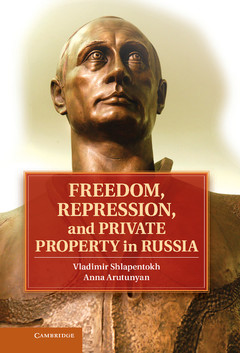Freedom, Repression, and Private Property in Russia
Langue : Anglais
Auteurs : Shlapentokh Vladimir, Arutunyan Anna

Demonstrates how the emergence of private property and a market economy after the Soviet Union's collapse enabled a degree of freedom while simultaneously supporting authoritarianism.
This study demonstrates how the emergence of private property and a market economy after the Soviet Union's collapse enabled a degree of freedom while simultaneously supporting authoritarianism. Based on case studies, Vladimir Shlapentokh and Anna Arutunyan analyze how private property and free markets spawn feudal elements in society. These elements are so strong in post-Communist Russia that they prevent the formation of a true democratic society, while making it impossible to return to totalitarianism. The authors describe the resulting Russian society as having three types of social organization: authoritarian, feudal and liberal. The authors examine the adaptation of Soviet-era institutions like security forces, the police and the army to free market conditions and how they generated corruption; the belief that the KGB was relatively free from corruption; how large property holdings merge with power and necessitate repression; and how property relations affect government management and suppression.
1. Private property and big money in political regimes in Soviet and post-Soviet Russia: a theoretical overview; 2. Ideology and public opinion in a centralized society and in a fragmented society; 3. Corruption, the power of state and big business in the Soviet and post-Soviet regimes; 4. Enemies and the issue of legitimization in the Soviet and post-Soviet regimes; 5. Political police before and after; 6. Treatment of strikers in Soviet and post-Soviet times: Novocherkassk and Mezhdurechensk; 7. Foreign policy: the geopolitical factor before and money after; 8. A freedom which Putin dearly loves - the right to leave his country; Conclusion.
Vladimir Shlapentokh was born, raised and educated in the Soviet Union. Before immigrating to the United States in 1979, he worked as a Senior Fellow in the Sociological Institute in Moscow, where he conducted the first nationwide public opinion surveys in the USSR. He is currently Professor of Sociology at Michigan State University and is the author of eighteen books.
Anna Arutunyan is a Russian-American journalist currently based in Moscow. She has reported on Russian politics for ten years and is the author of The Media in Russia (2009).
Anna Arutunyan is a Russian-American journalist currently based in Moscow. She has reported on Russian politics for ten years and is the author of The Media in Russia (2009).
Date de parution : 09-2013
Ouvrage de 218 p.
15.2x22.9 cm
Thème de Freedom, Repression, and Private Property in Russia :
© 2024 LAVOISIER S.A.S.



